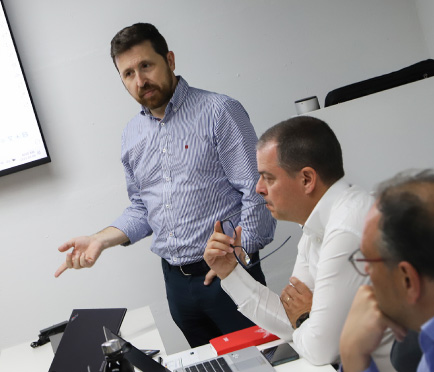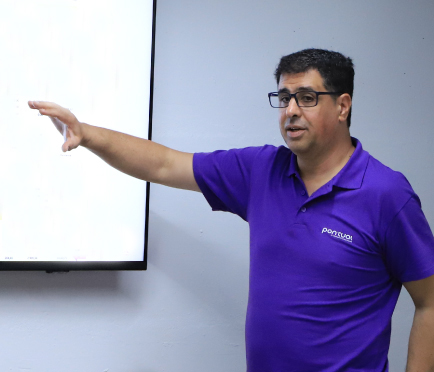The power of a solution 100% tailored to what you really need to grow your business
Are the tools you currently use unable to handle the complexity of processes in your company?
Aware of the intricate operations involved in warehouse management, maintenance, or production, we offer specialized software solutions for these sectoral areas and companies operating in these markets.
Such superior flexibility and parameterization capabilities will bring you even more control, efficiency, and profitability. Maximize the value of your investment by implementing a tool 100% suited to your organization.


Software for Industry, Warehouse Management, and Maintenance
Each sector has its challenges. Over more than 3 decades, PONTUAL has come to understand the needs of hundreds of entrepreneurs and has followed the development of their businesses and the emergence of new needs.
It is this know-how that now positions us as specialists in consulting and implementing solutions for companies in the industry, logistics, and maintenance sectors.
Talk to Us
Fill out the form below to request a consulting meeting, see a demonstration, or request a proposal. Count on a team of specialized consultants to assist you.
Implement the best processes with suitable sectoral features
With PONTUAL’s sectoral solutions for production, logistics, and warehouse managers, as well as maintenance operations, have features that streamline and bring significant improvements to daily work.
- Production planning based on orders and available stock (MRP)
- Control of raw material stock levels, finished product, and demand forecasting (MRP)
- Management of production capacity, raw material purchases, and cost monitoring (MRP)
- Execution of production planning outlined in the MRP (MES)
- Real-time monitoring of stock movements in the factory (MES)
- Integration of real-time quality control processes (MES)
- Automation of tasks, equipment monitoring, and real-time data collection (MES)
- Receipt, registration, and storage of goods
- Stock management (expiration dates, batches, serial numbers)
- Picking and Packing (order preparation, including assembly and packaging)
- Real-time tracking of product location and movement
- Optimization of storage and definition of more efficient routes for movements
- Quality control at product entry and exit
- Asset management, including scheduled maintenance and maintenance history
- Scheduling and management of preventive and corrective maintenance activities
- Efficient allocation and reservation of workspaces (offices, meeting rooms, among others)
- Management and monitoring of occurrences (safety incidents, maintenance, and others) and emergency response (fires, evacuations)
- Management of service providers (cleaning, security, maintenance) and control of costs associated with maintenance and energy consumption.
Looking for an IT partner to implement and evolve a robust production, warehouse or maintenance management solution?
If you wish to receive IT consulting for your company, see a product demonstration, or a commercial approach with specific pricing information, contact us.
Solutions Designed for your Market with Various Add-Ons
Areas such as industry, logistics, or maintenance have needs that only customized software can meet. And, in the case of companies with highly individualized processes, it is possible to add new layers of customization through add-ons or tailored developments.


Optimized Processes
The more the software is adapted to the best processes within your company, the more efficient the operations become, and consequently, the results increase.

Integration between Software
Gain greater benefits from sectoral software by integrating it with other tools you already use in your company’s management (ERP software, CRM, among others), including client systems.

Rigor and Extensibility
We add value from the moment of consulting, with process design and parameterization, to the development of supplementary add-ons that customize your software solution.

More Productivity and Competitiveness
Good practices and regulations are ensured in sectoral software, allowing you to free your teams from this concern. Optimized processes increase competitiveness and help you stay ahead of the competition.

More Quality and less Risk
Control operations with coherence and process standardization, meeting your clients’ expectations with the required excellence, without deviations.

Best Practices in the Sector
We combine our consulting experience with tailored solutions to help you implement the best practices and recommendations of each industry.

Regulatory Compliance
Each sector must comply with legislation and quality standards. With specialized software, managers have the assurance that all standards are met.
Gain Control and Visibility
Have a global and detailed view, in real-time, of your operations to extract maximum productivity from teams and profitability from the business.


Work Orders
Manage work orders rigorously, collaboratively, and transparently, with well-defined processes and real-time shared information by teams, through specialized software.

Stocks and Inventories
Stock and inventory management is simplified through item tracking features and low stock alerts, also providing visibility of items with excess stock.

More Agile Cost Management
With dashboards that gather updated data on business expenses, managers gain a broad view of costs, allowing them to reduce or optimize them in a timely manner.
Over 3,700 Clients Trust Us














Frequently Asked Questions
What is a WMS (Warehouse Management System)?
Your Subtitle Goes Here
- Goods reception
- Communication between warehouses
- Locations
- Separations
- Shipments
All this in an automated and intuitive way for operators.
What are the advantages of WMS software?
Your Subtitle Goes Here
Some of its advantages include
- Reduction of time in carrying out tasks, generating more guarantees of meeting delivery deadlines;
- Optimization of processes, facilitated by the automation of operations;
- Simplified monitoring and more careful management of merchandise, which leads to fewer losses in the process;
- Intelligent management of stock conditions, which ensures a higher quality of product status;
- Process integration;
- Minimizing unnecessary movement of goods.
What is production management software (MES and MRP)?
Your Subtitle Goes Here
In this context, we highlight two types of systems:
- The MES (Manufacturing Execution System), which makes it possible to monitor and control all stages of production in real time, through integration between the equipment on the shop floor and the ERP software.
- MRP (Manufacturing Resource Planning), which performs the calculations that ensure efficient management of the quantities of all the components needed for manufacturing.
What are the advantages of production management software?
Your Subtitle Goes Here
- Reducing waste and, consequently, production costs;
- Increasing productivity and efficiency;
- Stricter compliance with delivery deadlines, generating greater customer satisfaction;
- Reducing errors, particularly those associated with the misuse of information;
- Increasing the quality of the end product;
- A more integrated view of the production process through MES software, which acts as an intermediary between the ERP and the shop floor;
Optimizing processes makes it possible to introduce new (and more complex) products to the market, leading to increased revenue and business growth.
What is maintenance software (FMS)?
Your Subtitle Goes Here
In this way
- acts preventively and eliminates uncertainties;
- allows continuous monitoring of the assets’ key performance indicators (KPIs);
- brings together all the information relating to the company’s assets on a single platform.
What are the advantages of maintenance software (FMS)?
Your Subtitle Goes Here
Other advantages include:
- Rationalization and standardization of processes;
- Reduction of time spent on tasks and associated costs;
- Focus on a preventive maintenance strategy, which makes it possible to plan, prioritize and schedule maintenance operations and make more effective use of resources;
- Identification of new trends and forecasting of scenarios;
- Simplified sharing of data and insights.







